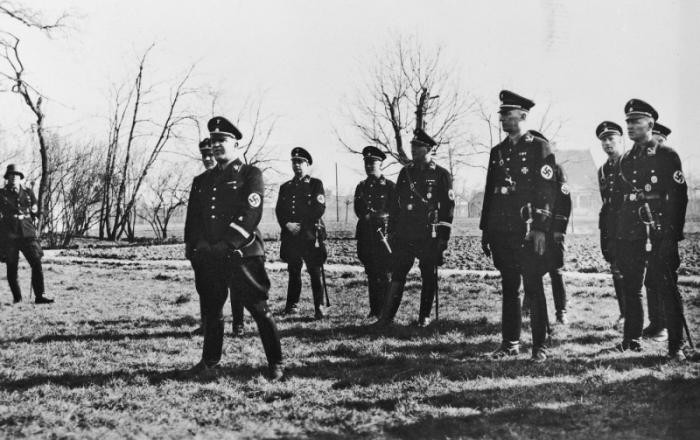
SS and Nazi Policy
SS and Foreign Policy
In 1937, the SS made its first foray into German foreign policy as it took over control of the Ethnic German Liaison Office (Volksdeutsche Mittelstelle; VoMi). VoMi ministered to the needs of ethnic Germans living outside the Reich. Though this involved economic and culture assistance prior to the war, the VoMi distributed clothing, furniture, and household equipment for newly resettled ethnic German communities throughout German-occupied Europe during the war. The SS supplied many of these items from personal property taken from Jews murdered at the killing centers.
SS and Foreign Intelligence
During the war the SD Foreign Intelligence Department (office VI of the RSHA) established intelligence networks clandestinely on the territory of Germany's Axis partners and occasionally conducted their own foreign policy in competition with the German Foreign Office. (Himmler had created the Security Service [Sicherheitsdienst-SD] in the summer of 1931.) Another rival of the SD in the realm of foreign intelligence collection and analysis was the intelligence service of the German Armed Forces (Amt Auslands/Abwehr) under Admiral Wilhelm Canaris. In February 1944, this office was incorporated into the RSHA as Amt Mil.
SS and Nazi Population Policy
During the heightened emergency that World War II raised in Germany, the SS expanded its power, particularly as the German military conquered Poland. The Reich Security Main Office (RSHA) sent six Operations Groups (Einsatzgruppen) of Security Police and SD into Poland behind the front to shoot and/or identify persons believed to be a danger to long-term German rule in Poland. Among their immediate victims were thousands of members of the Polish nationalist and cultural elite. The Einsatzgruppen also arranged to concentrate Poland's Jewish communities in large cities for “future removal.”
On October 7, 1939—ten days after German forces seized the Polish capital, Warsaw—Hitler appointed Himmler Reich Commissar for the Strengthening of German Ethnic Stock (Reichskommissar für die Festigung deutschen Volkstums-RKFDV). This position authorized the SS to plan, initiate, and control the pace of German settlement and population transfer projects in occupied Poland, and, later, in the occupied Soviet Union. As RKFDV, Himmler delegated to SS organizations the final say over who was German, where ethnic Germans should live, and what populations should be moved out or annihilated in order to make room for the German settlers.
In July 1941, Hitler extended Himmler's authority for both security and settlement operations to the occupied Soviet Union. Himmler's exclusive responsibility for security behind the immediate front line authorized the Einsatzgruppen and other SS and police units to initiate and direct the mass murder of Jews, Soviet officials, Roma (Gypsies), and people with disabilities living in institutions with the support of German military and civilian occupation authorities. With Hitler's agreement, the SS, within the rubric of its responsibilities for security and settlement issues, assumed the leadership role in planning and implementing the "Final Solution" as well as in annihilation operations conducted throughout the Reich against Roma (Gypsies).
SS and Lebensborn
The SS even became involved in making social policy for the German Reich. In December 1935, using private funding but within the institutional framework of the SS Race and Settlement Main Office, the SS established the Lebensborn ("Fount of Life") Society. Lebensborn was to care for children born out of wedlock to racially “suitable” women. Special Lebensborn homes provided a viable option to unwed mothers who might otherwise seek abortions (for which the Nazi regime increased criminal penalties in 1933). Himmler estimated that illegal abortions kept 100,000 "racially valuable" children from being born in Nazi Germany every year. The Lebensborn homes offered a protective atmosphere in which single women could have their babies, although Lebensborn authorities reserved the right to place babies born to single mothers into the program's adoption network if they decided a woman was not fit to raise her child."
The ideological basis for Lebensborn corresponded to Nazi social policy encouraging families to have large numbers of children: more racially suitable babies meant more racially suitable and superior soldiers and eventual unlimited expansion of the so-called German master race. During the war, the SS leadership reassured SS men serving at the front that not only their legitimate children but any illegitimate children (and their mothers) would be cared for in Lebensborn homes. Himmler and Deputy Nazi party chief Rudolf Hess were even prepared to urge German women to choose to conceive and bear children out of wedlock for the sake of the Reich, but this overt assault on the institution of marriage in name of the biological expansion of the race was too radical even for Nazi society in time of war.
Critical Thinking Questions
Research what pressures and motivations might have influenced members of the SS.
In what ways did the SS coordinate the activities of German and foreign police agencies to persecute perceived "enemies of the state"?

